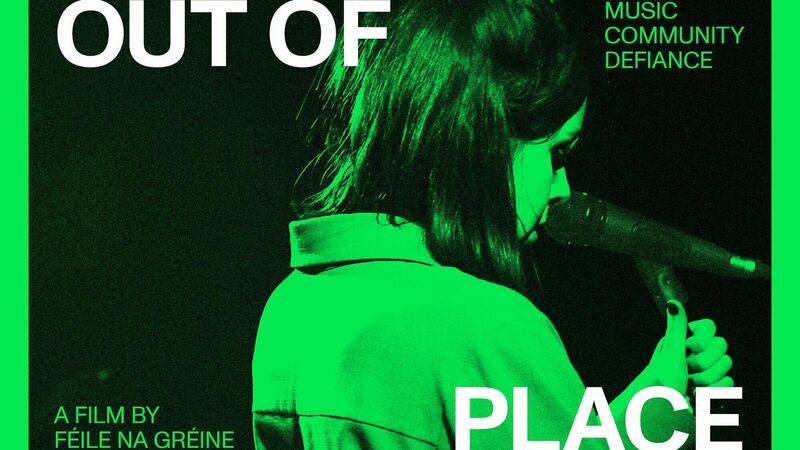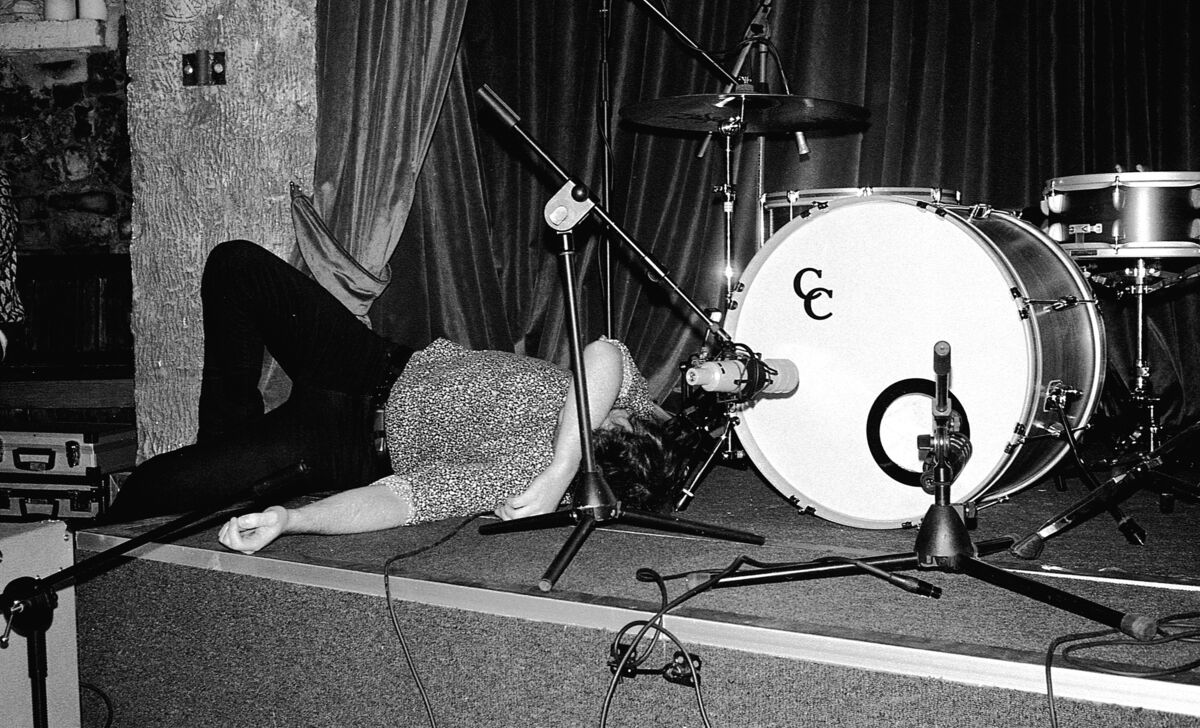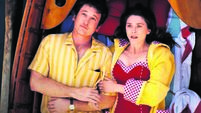Out Of Place - documenting Limerick’s DIY music mentality

Out Of Place screens at Triskel in Cork.
If there’s one point that this parish regularly strives to convey, but one that always bears repeating, it’s that Ireland’s independent musicians work hard to keep their heads above water, while following their creative impulses in a country that, proximity to the UK and Europe notwithstanding, presents challenges as far as the viability of regular gigging for specific audiences, and whose national media hasn’t always come with them on their respective journeys.
But for all the struggles and strife that face artists that wish to do things their own way, a sense of community pervades the DIY scenes of our cities and towns, where camaraderie and collaboration is part of the way of things, from swapping gigs and sharing gear, to pooling resources with local photographers, videographers and visual artists, to help carve out a niche, and identity, and a space to create in the cities and towns that have shaped their worldview and experiences.

It is this mentality that Out of Place, a documentary on the Limerick scene from the minds behind the city’s annual Féile na Gréine music weekender, documents in unflinching terms, flitting from in-situ sessions recorded around the city, to candid interviews with artists like Denise Chaila, God Knows and Murli, Post-Punk Podge, Hey Rusty, His Father’s Voice and others, including behind-the-scenes footage of video shoots and live gigs.
It’s an honest look at what it takes to create on your own terms, and the ties that bind creative communities together - which is what cinema-goers have responded to so far, says director Graham Patterson - including attendees of last November’s London Irish Film Festival.
“The response has been amazing. For a start, to be even selected for the Irish Film Festival was just a great achievement for us. When we set out, we weren't even really thinking of film festivals, we were advised to actually look at that type of thing, and once we started getting our heads into it, we were like, 'okay, we need to kind-of have a plan for film festivals, and get that all set'.
“Even just, in terms of reception, like, we were nominated for Best Documentary Edit, which absolutely blew our minds, and speaking to people at the festival, and people who've watched it, yeah, it's just been an overwhelmingly positive experience, from everyone. When you stick with something for so long, you kind-of can't see it for what it is, almost, at a certain point, and so for people to view it with fresh eyes, you can see from people's responses, they understand what we're doing as well.”
Such as it is, the documentary is an exploration of being in a city like Limerick, none too dissimilar from Cork in terms of size, population and challenges in civil society and infrastructure, and the dynamics that emerge between artists and others in the music community.
For Patterson and crew, it was important to capture that dynamic - especially as it exited the usual context of nightlife and regular gigging, and entered that strange, liminal period of the past few years of lockdown.
“We wanted to do something to celebrate our community in Limerick. We started this in 2020, during lockdown, and up to that point, the Limerick music scene was just thriving, gigs in Pharmacia and the Commercial. There was just a wave of great things happening, and we wanted to celebrate that. During the making of it, because you're doing this kind of reflection on what you think you know is your music scene, you start to realise it's not all daisies and roses, and all that. You start to realise where the flaws are, where things aren't so great, and we wanted to tell that story from a number of different perspectives.

“Post-Punk Podge was a really important person we wanted to get in there, talking to Hey Rusty, and he talks about the very DIY method of doing things, which is then in huge contrast to Narolane - Denise Chaila and crew - talking about wanting to take the world stage - they have different goals. They're very different approaches, but all under the umbrella of 'do it yourself'. Everyone's just working with the people in their community, using their connections, using the city to make their own thing work.”
If there’s one central plank or pillar of storytelling in the documentary, or even a protagonist, it is Limerick city, from the establishing shots of tall, riverside buildings, to the insides of its shops and gig venues, and into the homes and practice spaces of the artists profiled throughout.
On the basis of capturing Limerick as a city, both physically and in terms of confluence of people and ideas, Patterson discusses the main challenges and upsides that faced him in terms of direction.
“One of our first challenges was just the fact that we were making a music documentary. Primarily, you're shooting during lockdown - bands and musicians play gigs, a lot, but there weren't any gigs happening. We wanted to take that aspect and just run with that angle - most of this work is happening, not on the stage, the results that you see, that the audience sees, after all the hard work. We wanted to show what's going on behind all that, what you don't usually see. It puts you in a restraint, but you kind-of embrace that, then.
“In terms of Limerick city itself, we knew we wanted to show Limerick how we see Limerick. You could paint any city like a tourist video, we didn't want to do that, we have a certain way of looking at the city. Filming the sort of shots we have in the city, we wanted to do it from perspectives that we actually see on our day-to-day. So we looked down alleys, looked out windows.
“And it's constantly changing, like the city is always changing, O'Connell Street's had roadworks on it for the last year or two. Everything's changing all the time, and that's reflecting the kind of struggle that the artists are faced with, that the city is changing and is it changing for them, or is it changing in spite of them? Or does it acknowledge them at all? And regardless, the artists have to adapt to what that changing city is.”

This parish’s parochialism aside, there’s no denying that Limerick has always been along the bleeding-edge of Irish independent music, from the DIY explorations of Agro Phobia in the eighties, reissued a few years back by the Unscene crew; to an explosion in the 2000s led by bands like Giveamanakick, promoters like the Aspersion Music Collective and even a print magazine in the late, lamented Crude; to its current state, where Féile na Gréine, Lower Your Expectations and the crew behind the pre-pandemic DIY LK gigs have anchored a wide variety of the city’s DIY music, and the lifers of the latter are part of the city’s cultural life and infrastructure, from events like the biannual Siege of Limerick metal festival, to social work like MusicGeneration Limerick, including tutors like Steve Ryan (windings, GAMAK) and long-term skratchologist Naive Ted.
That strength of community, for all the realities and warts that an examination of same reveals, is also the glue that holds this cast of characters and creators together, says Patterson.
“Limerick is a small city - it literally brings people together. You can't really escape everyone, so everyone knows everyone. You might have different types of nights, different types of gigs going on, but everybody knows everybody running those gigs, and plays those gigs. So there's a lot of crossover, and even in terms of bands and projects that people get involved in, there's a lot of cross-pollination that has existed for years.
“I'm a blow-in to Limerick, but I'm aware of Steve Ryan and Naive Ted, they've been there for a long, long time, paving the way, making these things happen, and even going as far as teaching the new generation, in Music Gen, they do amazing work, and a lot of the acts that we actually see coming out, like Hazey Haze, Citrus Fresh and PowPig, they all kind-of come from those lads' work.
“Féile na Gréine, that was another cross-pollination of what was happening before lockdown with DIY LK gigs in Pharmacia, and Lower Your Expectations gigs run by Jack Brolly, and that coming together and going 'how about we just put on a weekend of music that is as diverse as all the music that we do put on throughout the year'.

“2018 was our first festival, and since then, for everyone that's involved with it, it's such a huge thing, that we get so much joy out of, and it really does make the bonds bigger within the city, but also, like, reaching out to the country, because everyone's coming from all corners of the country, now, to come to the festival. We had people camping in gardens and stuff last year. We fit them in, but... it's hard. That's our challenge for next year!”
‘Out of Place’ screens at the Triskel Christchurch, Tobin Street on Saturday, February 4, at 8pm, followed by a Q&A with the film’s directors. Tickets €10 from triskelartscentre.ie and venue box office.







